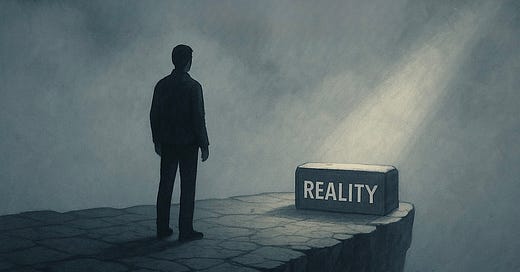When Reality Becomes Optional, Everything Falls Apart
A Case for Protecting Objective Truth in an Age of Subjective Narratives
As algorithms shape what we see and curated feeds filter what we believe, the idea of truth becomes increasingly negotiable. What once seemed obvious—facts, logic, reality itself—is now often questioned, debated, or reduced to a matter of opinion. But beneath all our perspectives and experiences lies something more fundamental: objective reality.
Objective reality is not just “what’s out there”; it’s what holds everything together. It’s the foundation of meaning, trust, and sanity. Without it, our understanding of the world—and our place in it—becomes disoriented. This article explores what objective reality is, how to identify it, and why protecting it is not just important—it’s essential for human dignity, reason, and justice.
1. What Is Objective Reality?
Objective reality refers to the state of things as they truly are, independent of personal feelings, beliefs, or perceptions. It is the reality that exists whether or not anyone agrees with it, likes it, or even knows about it.
A tree exists even if no one is around to see it.
Two plus two equals four, regardless of who’s doing the counting.
A lie remains false, even if it’s told with good intentions.
Objective reality is what is, not what we wish it to be. It is the foundation of truth—something that can be tested, examined, and reasoned about.
2. Why Objective Reality Matters
a. It Grounds Communication and Trust
Imagine trying to have a conversation with someone who denies the existence of time or who insists gravity is just a social construct. Without shared reference points rooted in reality, dialogue becomes incoherent. Objective reality allows us to speak meaningfully, build shared understanding, and solve problems together.
b. It Upholds Justice
Laws and morality require a belief in objective truth. If theft or harm is just a matter of opinion, justice becomes impossible. Courts depend on evidence, and evidence assumes that something real happened—independent of how anyone feels about it.
c. It Anchors Sanity and Personal Integrity
To be sane is to live in alignment with what’s real. Denying reality—whether physical, moral, or logical—leads to confusion, disorientation, and ultimately self-destruction. Our ability to make decisions, grow, and take responsibility all depend on our ability to perceive reality as it is.
3. How to Identify Objective Reality
In a world full of noise and bias, how do we learn to recognize what’s real?
a. Look for Consistency
Reality does not contradict itself. If an idea or narrative constantly needs exceptions, special pleading, or self-contradiction to stand, it likely departs from the real.
Example: If someone says “truth doesn’t exist,” they’re contradicting themselves—because that very statement would have to be true.
b. Test Against Evidence
What can be observed, measured, repeated, or logically inferred? Objective truths withstand scrutiny. Subjective beliefs may change, but reality does not accommodate preference.
Example: No matter how sincerely someone believes they can fly, jumping off a building without support will still lead to the same objective outcome.
c. Ask What Would Be True Even If I Disagreed
Objective reality does not need your agreement to be true. A good test is to ask: Would this still be true if I denied it?
Example: Fire will burn regardless of your opinion about combustion.
4. Why Objective Reality Must Be Protected
In recent times, culture has shifted toward what some call “lived truth” or “personal realities.” While experience is important, it becomes dangerous when elevated above reality itself. When subjective feelings override objective facts, truth is replaced by preference—and that opens the door to manipulation and power struggles.
a. Propaganda and Manipulation Thrive in Confusion
When truth is treated as fluid, whoever controls the narrative controls reality. This erodes freedom of thought. Protecting objectivity means defending your right to reason clearly.
Example: In totalitarian regimes, citizens are often forced to affirm obvious falsehoods (e.g., “2 + 2 = 5”) as a show of loyalty—not to truth, but to power.
b. Identity and Belonging Must Be Based on Reality
Compassion should never require denying the truth. When we sever love from truth, both suffer. Protecting reality means respecting people enough to ground their value in what is, not in illusion.
c. Progress Requires a Solid Ground
Science, medicine, and civil rights all depend on reality being knowable and stable. We can only build a better world when we’re standing on something real.
5. Living in Alignment with Objective Reality
Protecting reality starts on the personal level. Here’s how:
Seek truth even when it’s uncomfortable. Comfort is not a compass—reality is.
Value logic and evidence over emotion alone. Emotions matter, but they’re not facts.
Have the courage to name what is real. Even when it’s unpopular.
Treat truth as a duty, not an accessory. What is true should shape how we live—not the other way around.
Conclusion
Objective reality is not a philosophical abstraction—it is the ground beneath our lives. It makes communication meaningful, justice possible, and sanity sustainable. In a world where truth is often twisted to suit narratives or desires, we must relearn how to recognize what is real and defend it.
Because when we lose reality, we lose ourselves.





